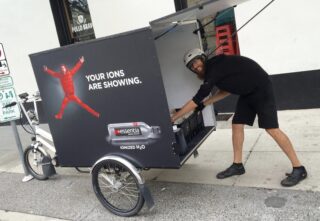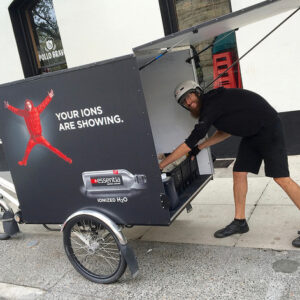
(Photo: J. Maus/BikePortland)
Portland-based B-Line has stood the test of time. And they also stand as an excellent illustration of how pedal-powered cargo trikes can have a positive, climate-friendly impact on urban freight delivery.
In 2020, the B-Line crew pedaled their fleet of electric-assisted trikes a total of 573,160 miles. That’s just one of the eye-popping stats in the company’s just-released annual impact report (PDF). The company launched in 2009 and moved their headquarters to the central eastside in 2015. Over the past decade, co-founder and current CEO Franklin Jones has stayed true to the company’s mission. They don’t just deliver freight (everything from bread to sports drinks), they’ve expanded to benefit the community in many other ways.
Advertisement
Their core business is last-mile freight delivery via their 600-lb capacity trikes, but they also do warehousing for small vendors and help promote brands on the sides of their cargo vehicles. In addition, they launched a partnership last year to deliver CSA shares to customers of two local farms. A partnership with Whole Foods Market allowed them to save over 21,000 pounds of food from the trash and deliver nearly 18,000 meals to people in need.
Here are a few other notable figures from the 2020 “impact report”:
– B-Line now serves 255 business, educational institutions and nonprofits.
– They avoided pumping 807,065 lbs of CO2 into the atmosphere (that’s the equivalent of flying round trip from Portland to New York City 516 times).
– They saved 39,944 gallons of gas and delivered 351,948 pounds of food and other freight.
After a modest start with two trikes in 2009, B-Line now has 14 trikes and 17 employees (and is looking to hire more). Learn more about the company at B-LinePDX.com.
— Jonathan Maus: (503) 706-8804, @jonathan_maus on Twitter and jonathan@bikeportland.org
— Get our headlines delivered to your inbox.
— Support this independent community media outlet with a one-time contribution or monthly subscription.







Thanks for reading.
BikePortland has served this community with independent community journalism since 2005. We rely on subscriptions from readers like you to survive. Your financial support is vital in keeping this valuable resource alive and well.
Please subscribe today to strengthen and expand our work.
Do they give a breakdown on the miles saved or the number of delivery trikes? That roughly 1400 miles a day assuming they deliver 7 days a week.
You’re right; the numbers just don’t seem to add up. That 1400 miles per day for the fleet works out to 100 miles per day per trike assuming all are ready to go every day. Assuming they are averaging 8 mph including stops for loading and unloading, they need to be on the road for 12.5 hours per day. That also suggest they are performing needed maintenance over night.
It’s a good idea and I’m supportive, but the claims need to be critically examined.
The report actually says 573,160 miles ,“avoided” (rather than “pedaled”) which could somehow mean something different, but maybe not…
I guess it doesn’t take any petroleum to charge those batteries??.. after you realize the fuel needed to keep the electrical grid going, to make batteries, or to make a wind turbine, you get a net loss of fuel overall.
but hey keep patting yourself on the back . the sky is clean near you. and black in some other country making thing for you
Citation needed. Just wait until you find out what it takes to manufacture a cargo van.
Our power mix in Portland is actually fairly clean, by US standards. Hydro and wind are a big part of the mix.
If you are concerned about the embodied energy of an e-bike, you’re going to be quite upset when you learn about the embodied energy of a diesel delivery truck.
How do you suggest we de-carbonize local deliveries?
We buy way too much stuff. Reducing our consumption would go a long way but good luck getting that to happen.